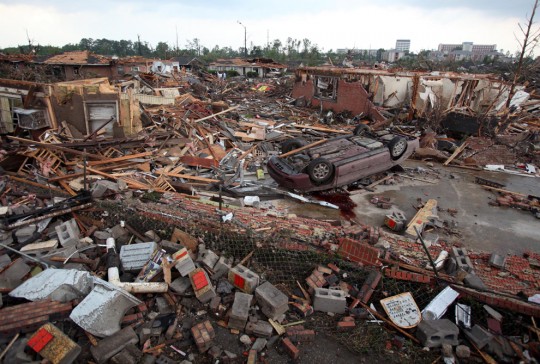The path of the Christian is not always bright with sunshine; he has his seasons of darkness and of storm. . . The day of evil reveals to us the value of our glorious hope. (C. H. Spurgeon)
In East Tennessee a mother suffers a broken leg and a devastated heart as a tornado claims the life of her baby.
In West Alabama a couple hears a noise and opens the front door of their home. Seconds later, there is no more home, and no more couple.
123 tornadoes, so I hear, in one day. The death toll at this point: 319.
Meanwhile, on the same day, in East Texas a spiritual champion and one of the most respected leaders of his generation collides with destiny in the form of a tractor trailer.
And as the world reels and the grieving begins in earnest, a rude reminder comes collecting – the winds blow and the rains fall on the just and the unjust, and none of us has any guarantee of tomorrow.
Does that anger you? Me, too.
Does it seem unfair? I get that. Why do tornados never seem to level prisons?
We can huff on our high horse all we want, but guess what? Neither you nor I will change the fact that life is unfairly short and at times unbearably hard.
Is that God’s fault? I’m sure we’ll get our dose of that from the usual sources. How come nobody ever “blames” God when money’s in the bank, gas is cheap and the ocean is calm?
“My God said things like this would happen.”
You turn man to destruction,
And say,”Return, O children of men.”
For a thousand years in Your sight
Are like yesterday when it is past,
And like a watch in the night.
You carry them away like a flood;
They are like a sleep.
In the morning they are like grass which grows up:
In the morning it flourishes and grows up;
In the evening it is cut down and withers. Psalms 90:3-6 NKJ
Bible passages like this are dreary to read. Until you’re living in the wake of that kind of hurt. Then it’s surprisingly relevant.
 When the tsunami roared across Indonesia and Thailand a few years ago and my wife led a team of people back for relief work, a surprising number of traditionally Muslim and Buddhist people were prepared to listen – and respond to – the claims of Jesus Christ. Why? First, because of the compassion of the Christians in providing hands-on care and helping restore businesses and homes.
When the tsunami roared across Indonesia and Thailand a few years ago and my wife led a team of people back for relief work, a surprising number of traditionally Muslim and Buddhist people were prepared to listen – and respond to – the claims of Jesus Christ. Why? First, because of the compassion of the Christians in providing hands-on care and helping restore businesses and homes.
Second, when still-grieving people were asking the predictable, understandable questions, Thai believers were able to open their Bibles and explain, “My God said that things like this would happen. But we can find our strength and hope in His love for us.”
In the one psalm attributed to Moses (who must have been having a really bad day when he wrote it), the man of God was struggling with these kinds of questions. God is from everlasting to everlasting, yet He gives us lives that feel like day-long grass. In the end, he concludes hopefully with this request:
So teach us to number our days,
That we may gain a heart of wisdom.
Return, O Lord!
How long?
And have compassion on Your servants.
Oh, satisfy us early with Your mercy,
That we may rejoice and be glad all our days!
Make us glad according to the days in which You have afflicted us,
The years in which we have seen evil.
Let Your work appear to Your servants,
And Your glory to their children.
And let the beauty of the Lord our God be upon us,
And establish the work of our hands for us;
Yes, establish the work of our hands (Psalms 90:12-17 NKJ).
There is wisdom here, when we’re ready to receive it – perspective from five simple requests from Moses (and us) to God:
1. Number my days.
We tend to use the wrong kind of clock to measure a life. We count birthdays we have experienced. And that makes sense, because we can actually calculate that. But in truth, your life right now is measured by the birthdays (and other days) you have remaining. We just don’t know what that figure is.
Wisdom comes when we learn to number our days as a countdown to destiny. You don’t have forever. You may not even have tomorrow. Life is priceless. For God’s sake (and yours), live like it.
2. Show me Your ways.
“Let your work appear to your servants,” he says. Translation: “We can’t see what you’re doing. But we want to know.”
Contrast that with the wags who come out of the woodwork with their philosophical questions about a cruel, or impotent, or nonexistent God.
Faith starts with a different perspective. It assumes that just because we don’t know God’s ways, that doesn’t mean He doesn’t have any. And it doesn’t mean we can’t ask to understand them.
In the words of a precious friend who was just told her daughter and grandson had been killed in a car accident, “The Lord visited this day long before I ever did.”
It’s OK to ask God why. While you’re at it, ask Him what He is doing and how He thinks. You may never get answers to satisfy your anger or unspeakable pain. Answers were never designed to do that. But you will experience a comfort and perspective you wouldn’t get any other way.
3. Beautify my life.
Life doesn’t have to be long to be full. But it does have to be beautiful. “Let the beauty of the Lord our God be upon us,” Moses prays. Literally, the favor of God.
Would it surprise you to hear that God has a different beauty standard than the world? I doubt it. Ask any parent of a special needs child. Beauty is not defined by looks and circumstances, but by the love, joy and peace that are the product of the Holy Spirit’s work. When He paints your life with kindness, gentleness, patience and the like, the storms only serve to make that inward beauty brighter.
4. Establish my work.
Haunted by futility in the wake of the Fall, each of us longs for a legacy. We want our work to have significance and meaning and to last beyond our lifetimes. Chuck Swindoll explains this prayer this way:
Instead of my thinking of these days as just about as futile as emptying wastebaskets, help me to see the significance of them in light of Your plan. When God confirms the work of our hands, He helps us see the value of the routine, the importance of what we once considered mundane, humdrum, – the same ol’ thing.
5. Satisfy my soul.
If our only answers are limited to this world, then we sorrow as those with no hope. That’s why Moses prayed, “Oh, satisfy us early with Your mercy, That we may rejoice and be glad all our days!” “Mercy” means covenant love. It’s in covenant with God – made possible by the resurrection and death of His Son – that we find the deepest satisfaction we long for.
You could live to be 100 or more, and without that, live and die in torment. But in a covenant relationship with God, based on His mercy and kindness, you can say with Jeremiah on your darkest day, “You are my refuge in the day of disaster” (Jeremiah 17:17).
Nothing can frame this more beautifully than David Wilkerson’s last published words – published on his blog on the day of his death:
To those going through the valley and shadow of death, hear this word: Weeping will last through some dark, awful nights—and in that darkness you will soon hear the Father whisper, “I am with you. I cannot tell you why right now, but one day it will all make sense. You will see it was all part of my plan. It was no accident. It was no failure on your part. Hold fast. Let me embrace you in your hour of pain.”
Beloved, God has never failed to act but in goodness and love. When all means fail—his love prevails. Hold fast to your faith. Stand fast in his Word. There is no other hope in this world.
